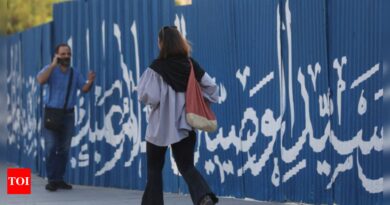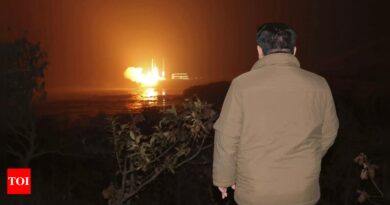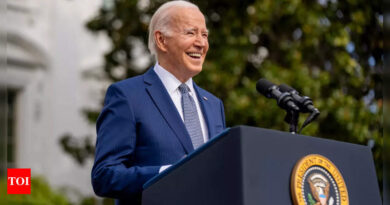Iran court orders US to pay damages for 1980 hostage rescue bid – Times of India
TEHRAN: An Iranian court ordered the US government Thursday to pay $420 million in compensation to victims of an abortive 1980 operation to free hostages held at the US embassy, the judiciary said.
Shortly after the 1979 Islamic revolution toppled the Western-backed shah, Iranian students stormed the US embassy in Tehran and took more than 50 Americans hostage for 444 days.
The students called for the extradition of the deposed shah, who was being treated in the United States.
In April 1980, Washington attempted to free the hostages in the top-secret Operation Eagle Claw, which ended in disaster after running into sandstorms and mechanical problems.
As the rescue force withdrew, two US aircraft collided, killing eight servicemen.
In its Thursday report, the judiciary’s Mizan Online news agency said that during the operation US forces had “attacked” a bus carrying Iranian passengers. It did not elaborate.
“Following the complaint filed by families of the victims of US Operation Eagle Claw, a court ordered the US government to pay $420 million,” Mizan said, without specifying the number of the victims.
Iranian media have reported that a local commander of the Revolutionary Gaurds was accidentally shot and killed by Iranian forces while standing guard over US military equipment abandoned during the operation.
Five months after the hostage crisis, Washington severed diplomatic relations and imposed an embargo on Tehran.
The hostages were released in January 1981.
In August, a Tehran court ordered the US government to pay $330 million in damages for “planning a coup” in 1980 against the fledgling Islamic republic.
The suits filed against Washington in Iranian courts following a series of multi-billion dollar compensation awards against Tehran by US courts.
In 2016, the US Supreme Court ordered that Iranian assets frozen in the United States should be paid to victims of attacks Washington has blamed on Tehran, including the 1983 bombing of a US Marine barracks in Beirut and a 1996 blast in Saudi Arabia.
In March this year, the International Court of Justice ruled that Washington’s freezing of funds belonging to several Iranian individuals and companies was “manifestly unreasonable”.
But it ruled it had no jurisdiction to unblock nearly $2 billion in Iranian central bank assets frozen by the United States.
Tehran, which denies all responsibility for the attacks blamed on it by Washington, has said that US court judgments have awarded victims a total of $56 billion in damages.
Shortly after the 1979 Islamic revolution toppled the Western-backed shah, Iranian students stormed the US embassy in Tehran and took more than 50 Americans hostage for 444 days.
The students called for the extradition of the deposed shah, who was being treated in the United States.
In April 1980, Washington attempted to free the hostages in the top-secret Operation Eagle Claw, which ended in disaster after running into sandstorms and mechanical problems.
As the rescue force withdrew, two US aircraft collided, killing eight servicemen.
In its Thursday report, the judiciary’s Mizan Online news agency said that during the operation US forces had “attacked” a bus carrying Iranian passengers. It did not elaborate.
“Following the complaint filed by families of the victims of US Operation Eagle Claw, a court ordered the US government to pay $420 million,” Mizan said, without specifying the number of the victims.
Iranian media have reported that a local commander of the Revolutionary Gaurds was accidentally shot and killed by Iranian forces while standing guard over US military equipment abandoned during the operation.
Five months after the hostage crisis, Washington severed diplomatic relations and imposed an embargo on Tehran.
The hostages were released in January 1981.
In August, a Tehran court ordered the US government to pay $330 million in damages for “planning a coup” in 1980 against the fledgling Islamic republic.
The suits filed against Washington in Iranian courts following a series of multi-billion dollar compensation awards against Tehran by US courts.
In 2016, the US Supreme Court ordered that Iranian assets frozen in the United States should be paid to victims of attacks Washington has blamed on Tehran, including the 1983 bombing of a US Marine barracks in Beirut and a 1996 blast in Saudi Arabia.
In March this year, the International Court of Justice ruled that Washington’s freezing of funds belonging to several Iranian individuals and companies was “manifestly unreasonable”.
But it ruled it had no jurisdiction to unblock nearly $2 billion in Iranian central bank assets frozen by the United States.
Tehran, which denies all responsibility for the attacks blamed on it by Washington, has said that US court judgments have awarded victims a total of $56 billion in damages.




